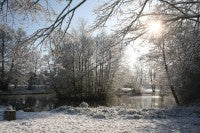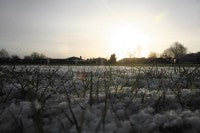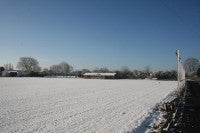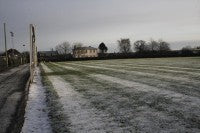In the deep mid winter...
 As a nation we Brits are obsessed with the weather. It's too hot, too cold, too wet, but never 'just right'. And, with the media getting apoplectic about the recent 'big freeze', causing panic buying and empty supermarket shelves, just what is going on with our weather patterns, climate change and global warming?
As a nation we Brits are obsessed with the weather. It's too hot, too cold, too wet, but never 'just right'. And, with the media getting apoplectic about the recent 'big freeze', causing panic buying and empty supermarket shelves, just what is going on with our weather patterns, climate change and global warming?
"I thought we were experiencing global warming?" I wouldn't mind betting that we have all said something similar over the past few weeks as the 'big freeze' gripped the UK. As always, even though we had fair warning that it was coming, we appeared to be spectacularly unprepared, with local authorities having to ration how much, and where, grit was spread on our roads.
Of course, the main arteries had to be kept open so that essential deliveries could be made to a panic buying public. Meanwhile, the lack of gritting on minor roads and pathways resulted in a Health & Safety fest as winter sports fixtures were cancelled due, not to the condition of the pitches, but to the Torvill and Dean scenario outside the stadiums.
So, what exactly is going on? If this winter has been the coldest in thirty years, how on earth (excuse the pun) can we be experiencing global warming or, more accurately, climate change?
 The first thing to point out is that the weather and our climate are two different things. According to NASA, the difference between weather and climate is a measure of time. Weather is what the conditions of the atmosphere are over a short period of time, and climate is how the atmosphere behaves over relatively long periods of time. When talking about climate change, we talk about changes in long-term averages of daily weather.
The first thing to point out is that the weather and our climate are two different things. According to NASA, the difference between weather and climate is a measure of time. Weather is what the conditions of the atmosphere are over a short period of time, and climate is how the atmosphere behaves over relatively long periods of time. When talking about climate change, we talk about changes in long-term averages of daily weather.
If summers seem wetter lately, then the recent climate may have changed. In various parts of the world, some people have even noticed that springtime comes earlier now than it did thirty years ago. An earlier springtime is indicative of a possible change in the climate.
Perhaps the largest influence on our planet's weather and climate is the sun because the amount of sunlight a location receives will determine its climate. Additionally, changes in the sun's intensity through time, and in the amount of sunlight let into the Earth's system, can drastically affect our world.
The amount of solar energy received at any location on Earth will affect the amount of precipitation and evaporation. This endless process of water transport, from clouds to ground and back again, is called the water cycle. Our atmosphere protects Earth from extreme temperatures and provides the stage for dramatic weather events.
But, hasn't our climate always changed and, if so, why is global warming so controversial today?
While climate change has always occurred, by mining and burning fossil fuels, thereby sending far too much carbon dioxide into the atmosphere, many scientists believe that we are greatly accelerating the warming process, so that we may have, unwittingly, opened a Pandora's box of unexpected and uncontrollable changes to life on our planet. According to the boffins, the rate of change today is rapidly increasing to the point that they are concerned that life on Earth, including humans, will not have time to adapt to the changing conditions.
Of course, one could remain sceptical about how they know the rate of change has increased when they have no 'barometer' to gauge by. But, that's another story.
Evidence of past changes to our climate comes from the geological records of ancient environments and glaciers, fossils of plant pollen, isotopes of elements such as carbon and oxygen, tree rings, and the distribution of fossils.
Okay, so that's sorted. Climate change is happening, but what about this wretched weather?
I'm still confused how we can have "the worst floods since 1927", "the hottest summer since 1976" or, as most recently, "the coldest winter in thirty years". If we have had all these weather patterns in the past, how can the climate be changing?
 The UK's weather is affected by all manner of weird and wonderful things - the position of the Gulf Stream as it makes its way across the Atlantic, El Nino meandering around the southern hemisphere or pesky Siberian winds. You may well remember a few occasions when sand from the Sahara has 'rained' down on us.
The UK's weather is affected by all manner of weird and wonderful things - the position of the Gulf Stream as it makes its way across the Atlantic, El Nino meandering around the southern hemisphere or pesky Siberian winds. You may well remember a few occasions when sand from the Sahara has 'rained' down on us.
But, even the experts confuse the issue. Professor Ian Hall, a Paleoclimatologist from Cardiff University, stated that "if you look globally, in most places the temperatures are above average for this time of year [January]. The Mediterranean, North America and Asia are all experiencing milder winters - in Canada it is 10OC above average."
Umm, well, actually, whilst Florida experienced frosts for the first time in decades (those records again), and Canada suffered extreme low temperatures that caused ice build up and breakage on power lines, you wonder where they get their statistics from.
Professor Hall adds: "It is important to remember that 2009 was the UK's fourteenth warmest year on record (records again), so the present cold snap doesn't say much about the global process of climate change, it is just part of a natural variation in climate, just like we sometimes have summer heatwaves."
 Last year we were promised a 'barbecue summer' by the forecasters and, as we all know, that didn't happen. That prediction was based, in part, on the then current position of the Gulf Stream. It took just a slight shift in its position - coming in further south than expected - to give us another wet summer. No doubt someone broke wind in Brazil to effect that change!
Last year we were promised a 'barbecue summer' by the forecasters and, as we all know, that didn't happen. That prediction was based, in part, on the then current position of the Gulf Stream. It took just a slight shift in its position - coming in further south than expected - to give us another wet summer. No doubt someone broke wind in Brazil to effect that change!
Seriously though, because of the position of the British Isles on the global map, sitting between the North Pole and the warmer Mediterranean and African climes, our weather is always likely to be a smorgasbord of bizarre events.
The forecasters have been pretty accurate over recent years at predicting the short term weather. It is looking ahead that still proves difficult.
So, there you have it. The weather is what you see when you open your bedroom curtains. Snow, rain, winds, frost, sun, showers are all 'weather'.
The climate is is the average weather in a location over a long period of time. A place that doesn't get much rain over many years would have a dry climate. A place where it stays cold for most of the year would have a cold climate. Simple!
In other words, look out of your window any day, any time and you see weather. Look out your window every day for a month or longer, observe the weather each day, and you can determine the climate.
And, anyway, without our British weather, what would we have to chunter about as a nation?
